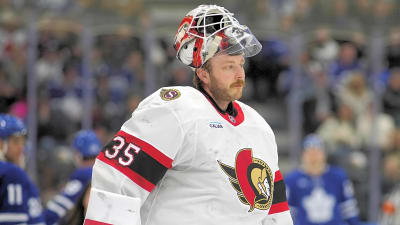
When you think of iconic lines in Detroit Red Wings history, the first ones that come to mind are the “Grind Line” and the “Production Line”. The younger hockey fan may not know much about the latter of these two lines, but with the news of Alex Delvecchio, who played a key role for it, passing away on July 1, what did he mean to the Red Wings organization?
On-Ice Excellence
Delvecchio did not take long to reach the mountain top in the NHL, winning the Stanley Cup in 1952, his rookie season. From 1952 to 1974, he played a vital role in the team’s success, including three Stanley Cups (1952, 1954, 1955). He spent all 24 seasons of his professional career with the Red Wings and took over Sid Abel’s spot alongside Gordie Howe and Ted Lindsay on what was known as the “Production Line”. This line was one of the most well-known in the league during their playing days.
With Howe and Lindsay alongside Delvecchio on the top forward line for the Red Wings, individual success often came for Delvecchio. Throughout his 24-season career, he was named to 13 All-Star Games. He won the Lady Bing Memorial Trophy (the player who best exhibits sportsmanship, gentlemanly conduct, and a high level of playing ability) three times (1959, 1966, 1969). While he was at times overshadowed by his linemates by fans, he was viewed very highly amongst his peers. In 1971, Phil Esposito mentioned that Delvecchio was one of the most underrated players in the league, but his opponents knew exactly how good he was.
When he decided to hang up his skates in 1974, Delvecchio fully established himself as one of the greatest Red Wing players of all time. He still ranks in the top five in organization history in all offensive categories, including third in games played (1,550), goals (456), and points (1,281). His postseason stats also have him in the top 10 in three major categories in the organization’s storied history. He sits ninth in games played (121) and sixth in assists (69). Delvecchio is one of the Red Wings’ greatest players of all time, earning Hockey Hall of Fame honors in 1977. He earned that recognition from the organization in 1991, when they retired his jersey, and then earned further recognition as one of the NHL’s 100 Greatest Players in 2017.
Post-Playing Career
After Delvecchio retired from the NHL, he stuck around the Red Wings organization for a few more seasons in off-ice roles. He took over the reins as the team’s head coach from 1973 to 1975 and from 1976 to 1977, while holding the dual role of head coach and general manager (GM) starting in 1974. His success did not translate from the ice to behind the bench as much, and he did not last in either position after those four seasons.
Delvecchio remained a constant presence in the community after his playing days concluded. He participated in many alumni events and was found around ice rinks, watching the younger generations of players grow the sport.
Detroit Loses a Legend
Delvecchio was the last living member of that famed “Production Line”, as well as the last living member of the 1952 and 1954 Stanley Cup-winning Red Wings teams. The passing of the Hockey Hall of Famer affects not just the Detroit hockey community but the entire NHL. He remains a testament to loyalty and what it means to be an example and role model for hockey players of past generations, and even the younger generations who learn more about him.
More must-reads:
- Blue Jackets remain epitome of dysfunction with another coaching change
- Alex Ovechkin reaches another big milestone for Capitals
- The 'Active 1K-receiving-yard seasons' quiz
Breaking News
Trending News
Customize Your Newsletter
 +
+
Get the latest news and rumors, customized to your favorite sports and teams. Emailed daily. Always free!








